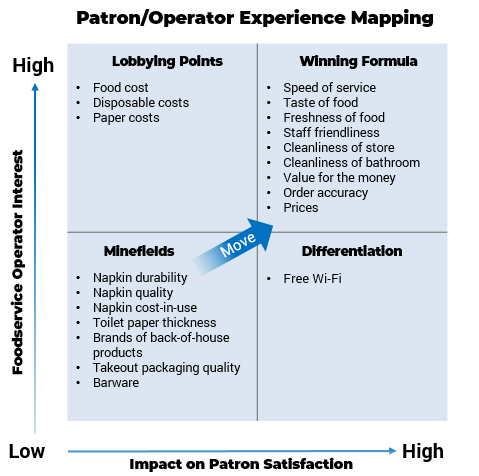Packaging and disposables are not necessarily top-of-mind for consumers relative to other aspects of a foodservice experience. For that reason, the category is one that can receive less operator attention, particularly during the extended post-recession industry slump. But now that states are passing laws regarding plastics, and the industry is more comfortably established in its rebound, how have consumer interest in “green” and growing focus on takeout altered operators’ thoughts?
Some Facts from FSIP
- Half of operators (51%) report using the same container for multiple applications, such as sandwiches and/or burgers. Full-service midscale restaurants (62%) are most likely to use the same container.
- Most important attribute in takeout packaging for consumers: no leaking/seeping (74%), durability (58%), followed by environmentally friendly material (54%).
- Most preferred eco-friendly packaging features by consumers: biodegradable (45%), recyclable (40%) and compostable (13%). However, most consumers do not know what these terms even mean.
Elevate Packaging as a “Must-Have” for Diners
As a low-interest category, disposable packaging, napkins, utensils and the like will never be as important as say, the taste of food or the brand of restaurant when making a destination decision. However, manufacturers who count on packaging in the delivery-heavy market must help foodservice operators elevate the category into a “must-have” (see quadrant). This means showing patrons that if say, a napkin or takeout box weren’t available, then the consequences of not having one “ruins” the dining experience.

In addition to this primary barrier, In June 2019, Foodservice IP held a one-day think-tank style session with its closest customers. We identified additional hurdles and opportunities for takeout packaging:
- Patron Education – few consumers are familiar with the meaning and applications of compostability, biodegradable, post-recycled content and recyclability. There is a common notion that products that are paper are more environmentally friendly (EF) than other materials. While straws have garnered a lot of attention lately, lids, stirrers and soufflé cups all have similar issues with recycling due to size.
- Functionality of Packaging is Paramount – While consumers “want” eco-friendly products, and operators try to fulfill that need, the issue surrounding EF materials is primarily one of function. Many eco-friendly products do not perform as well as its non-EF counterparts (consider corrugated clams shells versus foam and paper straws versus plastic).
- Pricing Issues: Most operators are not able to “charge” for EF packaging products as they are a cost item. Eco-friendly products are typically more expensive than non-EF products. While consumers ask for EF packaging, few are willing to pay extra for it.
- Problems with Permanentware: Many raised the issue of waste with packaging and how using permanentware could reduce the reliance on packaging products. A participant mentioned that using permanentware leads to capex (warewashing equipment) and labor expense (cleaning and drying) – not to mention storage space. One of the solutions mentioned was a bringing one’s own cups and straws as potential options.
- Legislation – these occur with segments (C&U) and certain geographies have banned certain materials and/or required a certain percentage of EF-friendly packaging products be used. Each supplier should learn about their segments and locales as they develop menu ideas.
There is never going to be a “right” answer for the type of packaging that will fit functionality and price for both consumers and operators. However, legislation will largely dictate what materials the industry must use. While only regional and local bans have occurred, we expect these to continue. The best method manufacturers can use is to continue to be informed, check patron desires regularly and jointly develop products with operators with packaging in mind.
Looking for more insights on the foodservice packaging industry? Contact us today.

Recent Comments